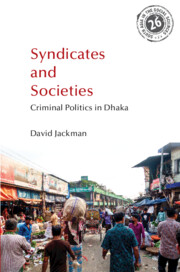7. - When Crime Is Order
Published online by Cambridge University Press: aN Invalid Date NaN
Summary
Syndicates in Bangladesh are felt in many ways. They are felt in the higher prices when the supply of goods is manipulated. They are seen in the shoddy quality of public infrastructure when contractors skim contracts and skip on inputs. They are felt in the hefty sums demanded for jobs in the public sector. They are felt in the violence and conflicts between rival political leaders and their followers when they compete for dominance. But perhaps most pressingly, they also felt in the relationships that people sustain to get by in everyday life. The core argument developed here has been that behind many of the diverse dependencies that people rely upon to get work, seek security, find opportunities and other resources, lie syndicates. Syndicates are the coercive control that a particular group or network exercises over a resource to their advantage. Many syndicates are embodied by individuals sustaining that coercive hold on a resource and mediating access to it. Many intermediaries are thus racketeers.
For some, the syndicates that carve up the lanes of Kawran Bazaar could be seen as somehow peripheral to life in the city, distant from where the real capital or authority lies. These dirty streets feel much like the city's other creases and crevices such as the bastis, transport terminals, parks or footpaths where the lower classes live and work. Similarly, when syndicates come to public light, we could easily get the impression that these are a scattered phenomenon, examples of particularly egregious politicians or officials. In drawing together odd combinations of actors such as the leader of an Awami League affiliate body and opaque lineman, as well as a very wide range of sectors, they seem idiosyncratic. Others might also characterise the politics we find here as that at the ‘margins’ of the state. Yet the story told here is that syndicates should be seen as fundamental to Bangladeshi politics. Though the labourers may be poor, and the streets may be dirty, there is nothing marginal about the politics we find here. This is the lifeblood of the nation's politics in microcosm. This is the core, the unstable bedrock on which politicians build and parties rest. Syndicates are not merely the whims of greedy people in power but serve to sustain the authority of political leaders.
- Type
- Chapter
- Information
- Syndicates and SocietiesCriminal Politics in Dhaka, pp. 166 - 184Publisher: Cambridge University PressPrint publication year: 2024



